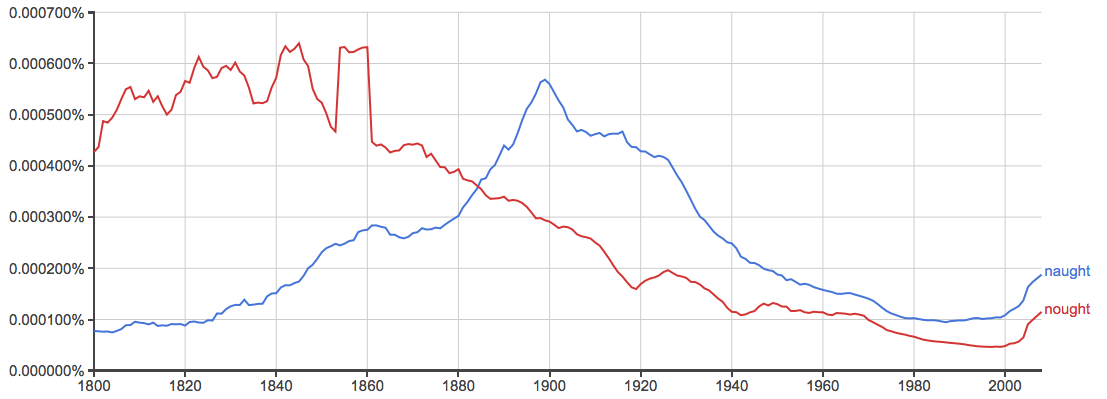Many of the languages in use today have been around for millennia. English has gone through many changes during that time, and while most of the language has evolved, a few words have survived to the 21st century almost intact.
Naught and nought are two such words. They are actually spelling variants of the same pronoun, which is several centuries old.
Any time you have an archaic word, you should ask yourself if there is a newer, simpler word that you could use instead. Even in academic and professional writing, simplicity and relatability are virtues that all writers should seek to cultivate.
Continue reading to learn how to manage nought and naught in your own writing.
What is the Difference Between Naught and Nought?
In this post, I will compare naught vs. nought. I will also use each of these words in example sentences, so you can see them in context.
Plus, I will show you a memory tool that will help you remember whether you mean nought or naught when you need to use these words.
When to Use Naught
 What does naught mean? Naught is a pronoun. It is basically a synonym of nothing, like in the phrase all for naught.
What does naught mean? Naught is a pronoun. It is basically a synonym of nothing, like in the phrase all for naught.
Its use is considered archaic, but it is still used in some phrases. In general, however, most writers today would just use nothing.
Here are a few examples of naught in a sentence,
- When I was naught but a wee lass, we washed our clothes in a bucket.
- I tried my best to overthrow the government, but it was all for naught.
- There was naught but disappointment for Cubs twirler Jason Hammel. –The New York Times
According to Merriam-Webster, naught comes from the Middle English word nought, which itself comes from an Old English compound nawiht, meaning literally no thing.
A somewhat common phrase formed with the word naught is came to naught.
- In December a private-sector restructuring scheme came to naught and the state decided to step in. –The Economist
This phrase is so spelled and shouldn’t be spelled came to nought.
When to Use Nought
 What does nought mean? Speaking of nought, it is a spelling variant of the same word. Nought is even more archaic than naught; it has survived basically intact from Middle English and has been in use for at least a thousand years.
What does nought mean? Speaking of nought, it is a spelling variant of the same word. Nought is even more archaic than naught; it has survived basically intact from Middle English and has been in use for at least a thousand years.
- Grand National punter accidentally added a nought and bet a ‘crazy’ £200 instead of £20 – then watched his horse romp home netting him £2,000 –The Daily Mail
Nought has come to mean nothing in a mathematical context, i.e., it is used to indicate zero. Naught, however, is used in non-mathematical contexts when nothing is meant.
As the following chart shows, both words were more popular on years past. Over time, they have been used less and less, and their uses began to indicate slightly different things (mentioned above).
Nought vs. Naught:

The graph isn’t completely exhaustive in its scope, since it only looks at one data set of books published in English since 1800, but it clearly illustrates a well-defined, long-term usage trend.
Trick to Remember the Difference
In most circumstances, especially formal writing, you should really be using nothing instead of naught or nought. These archaic words run the risk of seeming pretentious, stilted, or both.
In modern writing, these words would be employed for style or effect. If you want to draw attention to a sentence or a paragraph–or one of these words flows better with the rhythm of your prose better than nothing–you might use nought or naught.
Additionally, in a period piece of writing that is set in the 1800s, these words might find themselves getting used, but as for general prose in the 21st century, these words seems out of place when nothing can more simply do the job.
For British audiences, who are more likely to use nought to mean 0, you can remember that the o in nought looks like a miniature zero.
For just about every other use, though, stick with nothing instead.
Summary
Is it naught or nought? Nought and naught are spelling variants of an archaic pronoun that means nothing. British writers occasionally use nought to refer to the number zero.
Since both of these words are so old and uncommon, though, you should simply use nothing in virtually every other context.
Contents
